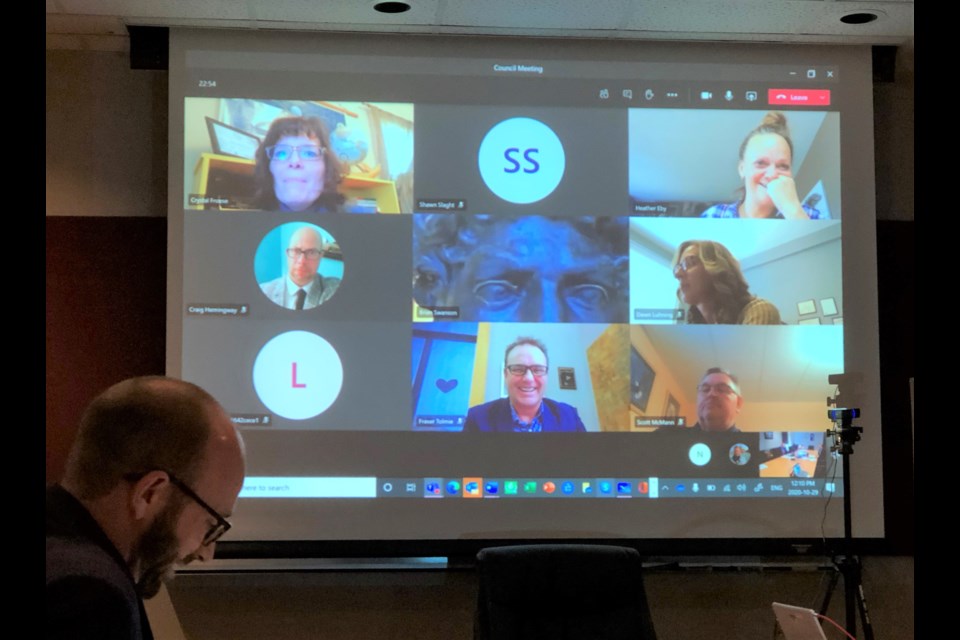The City of Moose Jaw could reduce its greenhouse gas emissions by 338 tonnes per year and save $44,150 in utility costs per year if a federal funding application for solar panels is approved.
The solar upgrades would be for YaraCentre, Mosaic Place, Kinsmen Sportsplex, the public works complex and city hall. Funding is available under the COVID-19 resilience infrastructure stream of the Investing in Canada Infrastructure Program (ICIP).
The project’s cost is $1,037,800, with $830,240 expected to come from ICIP funding. The municipality would contribute $138,725 from a municipal solar initiative fund in the 2020 budget and $68,835 from the 2021 municipal budget.
During a special council meeting on Oct. 29, council voted 5-1 to authorize city administration to apply for the funding.
Coun. Brian Swanson was opposed while Coun. Chris Warren was absent.
Council discussion
“Not only is this a solid decision for climate and climate change and doing our best to reduce our greenhouse emissions, it’s also a good solid business decision,” said city manager Jim Puffalt.
Puffalt added that ground-based solar panels were not eligible, which meant city administration couldn’t include the wastewater treatment plant even though it has plenty of adjacent space. However, it could happen once city hall sees how these panels perform.
Coun. Dawn Luhning wondered if other projects could have been considered, as she didn’t understand why the solar project had been “catapulted” to the top of the list.
Upgrading pathways was one option, but city hall did not have tangible information it could send with the report, city administration explained. The cast iron replacement project was also ineligible since it wouldn’t be completed by Dec. 31, 2021, as per the criteria, while panels can’t be installed at the library or art gallery since their collective roof needs to be replaced.
“I think this is a great initiative … . I think anything that can help us alleviate some of the costs here for utilities — (I’m) especially thinking Mosaic Place. The amount of money spent over there in just power bills is just crazy,” said Coun. Crystal Froese.
What concerned Swanson was how city administration failed to provide other options for ICIP funding. He didn’t believe the municipality didn’t have a project of $1 million that was eligible. He pointed out that council was given “dire warnings” years ago about the state of the city yards and compound.
The criteria said the project had to be a building or asset, it had to be completed before 2022, and it had to be shovel-ready, explained parks and recreation director Derek Blais. Meanwhile, there is a project for the city yards, but there is no matching funding or a source for that money.
“I can assure you in the City of Moose Jaw … there’s no shortage of things that need $1 million worth of work,” said Swanson. “Spending three-quarters of this on recreation facilities is not something I’m really excited about.”
This is about energy consumption, and while these panels are going on recreation buildings, the municipality owns those buildings and still pays their power bills, said Mayor Fraser Tolmie. This project is still a priority, even though council faced challenges with other ICIP-related projects previously.
Project background
To be eligible, projects must be worth less than $10 million and construction must start no later than Sept. 30, 2021, a council report explained. Council approved the solar program in the 2020 capital budget but paused the program since ICIP funding was unavailable.
City administration chose the five buildings based on the sound condition of their roofs, annual power consumption and payback forecasts, the report explained. Four buildings will receive about 250 solar panels; city hall will receive 65 panels due to space issues. The projected financial payback is 4.7 years.
The next regular council meeting is Monday, Nov. 16.




